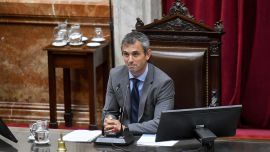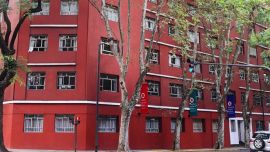Sergio Massa has announced that the International Monetary Fund will open an investigation in late November to study and probe “capital flight” from the multi-billion-dollar credit line contracted with the multilateral lender by Mauricio Macri in 2018.
During an interview, Massa revealed that “at the end of the month, IMF will start an investigation on the capital flight from the 2018 stand-by agreement”.
Massa added that the body would send “a commission to Argentina that will conduct a review of the 66 percent which, according to the AGN Auditor-General, was not used to finance hospitals, schools or to solve economic stability, but to finance the payment to investment funds”.
This was the agreement for US$57 billion, out of which nearly US$ 46 billion were disbursed, because in 2019, the last section was stopped after the electoral defeat of Macri by Alberto Fernández.
“The IMF’s stand-by agreement does not meet the established criteria for negotiation and execution (applicable regulations)”, the AGN’s Public Debt Supervision Commission pointed out in February this year.
Irregularities such as “guarantees in excess of the authorised amount; inconsistencies in the disclosure of the debt in financial statements the issuance of debt without the quota established by law at the time of issuance”, as indicated by the document presented by the ruling party majority of the body.
In the meantime, president of the AGN Jesús Rodríguez and auditors Alejandro Nieva and Miguel Ángel Pichetto expressed their differences on some of their colleagues’ statements. The former Peronist senator and Macri’s running mate in 2019 presented a minority report explaining that there were no breaches in the agreement with the IMF.
It is worth remembering that the body comprises seven members: three elected by the Senate, three by the Chamber of Deputies and the president elected jointly by both chambers.
The Macri government took out the loan at the time when Christine Lagarde was managing director of the IMF, and he was accused of allegedly violating administrative procedures.
The report underlined that the supporting documentation and case files were generated in the GDE system after the agreement was subscribed and they were incomplete, as well as disorganised. Some documents were also found without the digital signature which validates administrative acts.
The loan was not completed through a Law or Presidential Decree. The agreement was signed by the Economy minister, who did not have jurisdiction over Public Credit management.
Article 61 of Law 24,156 was violated, which establishes that in the event that public credit operations bring about foreign public debt, the Central Bank must issue an opinion on the impact of the transaction in the balance of payments.
On the other hand, the body made reference to the way the Macri administration handled the foreign exchange market and its impact on indebtedness: “The novel measures implemented in foreign exchange implied a risk of dollarisation of short- and medium-term portfolios. In this setting during the 2016-2018 period, the Central Administration increased its total debt. By observing its breakdown, it may be noted that both its foreign debt and debt in foreign currency increased”.
Foreign debt accounted for 17.7 percent of the GDP in 2016 and in merely two years (2018) that percentage climbed to 41.8 percent. Meanwhile, gross debt in foreign currency, which in 2016 accounted for 36.3 percent of the GDP, reached 65.8 percent in 2018.
The report highlighted that debt maturities for 2019 accounted for 192.75 percent of the stock of international reserves as of December 31 that year, and for 131.36 percent of the stock of international reserves by the end of 2018.
“Debt was not sustainable. In other words, the corrections required both in the balance of payments (including the trade balance) as well as the future primary tax profit and loss in order to make the public debt sustainable in such context were very unlikely to materialise given the historic deficit in those accounts and considering the applicable foreign exchange regulations, in addition to the volume of Letters issued during the three-year period in question”, the AGN added.
Moreover, regarding the maturities of debt in foreign currency, it specified that in 2019, 2020 and 2021, at least 60 percent of international reserves had to be allocated to the payment of principal and interest maturities, with its ensuing impact on reserves and the foreign exchange market.
The operation was labelled “extraordinary” due to the volume requested and as Argentina had never consented to such indebtedness with the financial body.
Former director of the IMF Alejandro Werner ruled out the possibility that the investigation to be carried out by the body’s Independent Evaluation Office (IEO) will be an audit of how the stand-by credit funds granted during Mauricio Macri’s government were used.
Thus, Werner refuted the Economy minister and presidential candidate Unión por la Patria, Sergio Massa, on the nature of the investigative process.
During an interview, Werner specified that “the IEO will not make a ‘review’”, but explained that it will be an analysis of the exceptional programmes to access the body’s funds, with a view to “checking whether the current framework is adequate”.
In this vein, he pointed out that “it’s not about how the money was spent or how the programme was approved”, since “the focus of the evaluation is whether the design scheme was the right one; it’s not an audit on how the money was spent”, and accused Massa of “bordering on lying”, and said that the “minister’s misinformation is surprising”.
Regarding the debate over the use of the credit funds to finance a capital flight, Werner said that “in Argentina there is a faction repeating that story with the intention of causing confusion, and it resurfaces prior to the election due to the disastrous handling of economic policy by this Government”.
Following that line, he assured “the Fund’s statutes in multiple crises indicate that IMF programmes must be aimed at reinstating the conditions to access capital markets” and stated that “capital flights may not be financed because otherwise the reserve levels are not re-established”.
In this respect, and assessing the credit granted to Macri’s government, Werner acknowledged that “the programme may have had significant weaknesses on the capital flow front, on whether or not to impose capital controls” and pointed out that “they are elements which could make it more resilient: capital controls conducted earlier and pre-emptively”.
In addition, he remembered that “there was also a debate on foreign exchange intervention”, an aspect on which for some time he has been criticised by Luis Caputo, the former Finance minister and president of the Central Bank during the Cambiemos administration.
According to the former IMF officer, “the stand-by agreement loan with the Macri administration had the necessary elements for a stabilisation programme, which go to the core of the macro imbalance in Argentina”.




















Comments